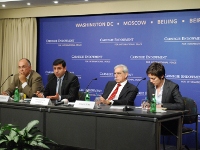Registration
You will receive an email confirming your registration.
IMGXYZ2491IMGZYXLast August, the Justice and Development Party (AKP) government launched an opening to Turkey’s large Kurdish minority designed to acknowledge their cultural distinctiveness and recognize some political rights. Despite the great hopes engendered, almost nine months later, the opening seems to have run aground, as the government focuses instead on constitutional changes to redress other issues.
Not only is the Kurdish question not going away, it has also acquired an important international dimension. The fate of Turkish Kurds is interlinked with their brethren across the border in northern Iraq. As the United States prepares to withdraw from Iraq, the United States and Turkey have a vested interested in maintaining peace and stability in the Kurdistan region of Iraq.
Carnegie hosted a discussion on the Kurds continued struggles in Turkey and the effect of the Kurdistan Regional Government’s success in northern Iraq with Ahmet Türk, a former Turkish Member of Parliament and Selahattin Demirtas, the current co-chair of the Peace and Democracy party (BDP). Carnegie’s Henri Barkey moderated the event.
Turkish Kurds’ Demands
The Kurdish people are an integral part of the Middle East, with Kurds living in Iraq, Iran, Syria and Turkey, yet they are often not acknowledged as such by other ethnic communities. According to Türk, the Kurds in Turkey have three demands:
- A constitutional recognition of the ethnic and linguistic differences among all citizens of Turkey
- Cultural recognition and official usage of the Kurdish language
- The decentralization of the administrative system so as to allow greater local decision making in all regions of Turkey and not just Kurdish majority regions
A Foundering Opening
The Turkish government’s announcement of its plans to implement an opening policy towards the Kurds was met with much fanfare. Over the course of the last nine months, hope has dwindled as it seems that the AKP led government has placed its priorities elsewhere, namely on a robust, inclusive foreign policy and on constitutional issues related to the relationship between civil society, the judiciary and the military.
- Responsibility: Selahattin Demirtas placed the onus for the failure to implement this opening policy on the government.
- Fresh Start: Even if renewed efforts are delinquent, many of the Turkish Kurds are willing to welcome any attempt to successfully and fully implement this opening. Demirtas’ Peace and Democracy Party (BDP) has and will continue to “give its moral support to the government’s efforts to reach a resolution to Kurdish problem.”
- Moving Forward: According to Demirtas, the most efficacious avenue for solving the Kurdish problem is the establishment of a parliamentary commission that would develop a roadmap with concrete step for constitutional changes.
Kurds in the Region
The Turkish government has reoriented its policy towards the Kurds in northern Iraq and is increasingly developing a relationship with the Kurdistan Regional Government (KRG).
- Power Play: Ostensibly this is a positive harbinger for the Turkish Kurds. However, as Kurds, Türk argued that they would oppose efforts by the Turkish government to use its relations with the KRG to diminish ties between Iraqi and Turkish Kurds or manage Turkish Kurdish demands.
- Regional Perceptions: Türk suggested “Kurds in Syria, Iraq and Iran all believe that the key to solving the problems of the Kurds is with Turkey and its ability to give Kurds rights at home.” It is undoubtedly in the best interest of the Turks to work to solve the Kurdish problem in order to boost their international standing.
Violence and the PKK
The long festering conflict between Turks and Kurds in Southeast Turkey has resulted in a heavy loss of life.
- PKK Responsibility: Although the Kurdistan Workers’ Party (PKK) is responsible for perpetrating acts of violence against Turks, Demirtas noted that “the PKK is part of the reality of the conflict; it has an important constituency in the region and therefore is an important actor in the resolution of the Kurdish problem.”
- Curbing Violence: Demirtas also asserted the acts of violence emanating from both sides should immediately cease and that both sides should take the necessary political risks to begin this process. “This problem cannot be solved by force, it is necessary to begin a dialogue process involving all actors,” Türk noted, restating Demirtas’ assertion.
President Obama and Turkey
The United States and President Obama are well aware of Turkey’s rising prominence in the Middle East and the international arena. Consequently, the administration will be careful in pressuring Prime Minister Erdogan’s government on the Kurdish problem. Although Türk sees the election of Obama as an important ray of hope for all subjugated peoples and expects his administration to contribute to the flourishing of democracy in the region, he believes the problems of Turks and Kurds must be resolved by negotiations between the Turks and Kurds, not by a U.S.imposed solution.
